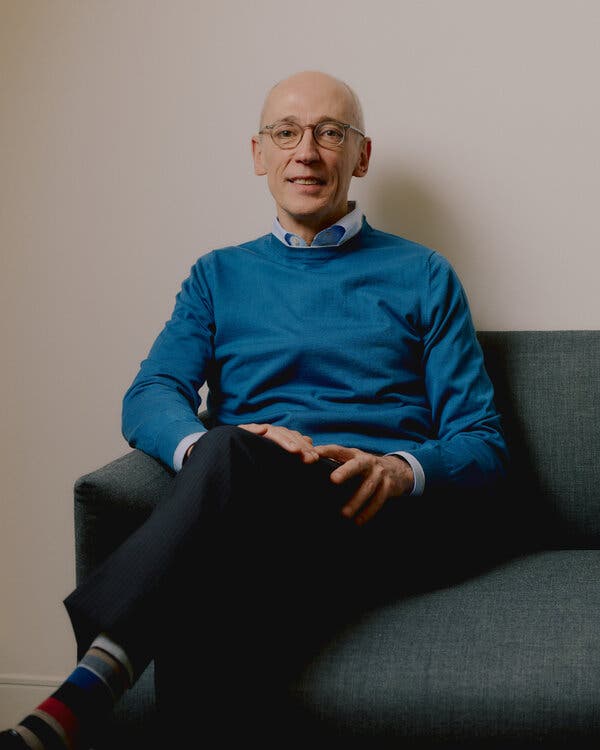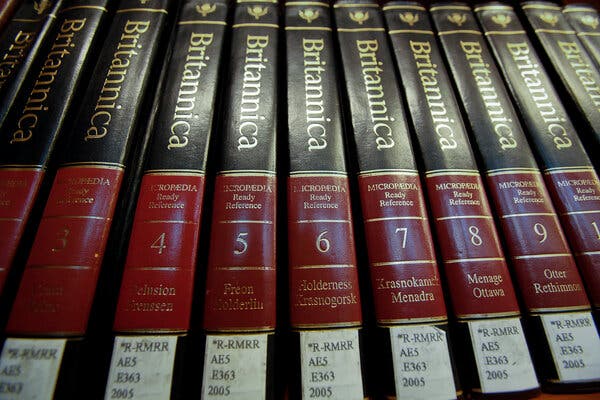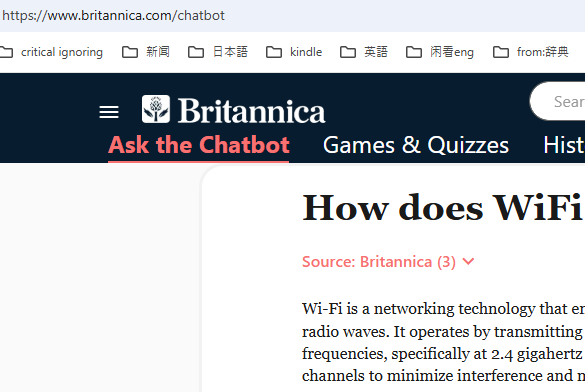原新闻标题:
Britannica Didn’t Just Survive. It’s an A.I. Company Now.
The encyclopedia maker could have become a casualty of the Wikipedia era. But it has remade itself into a digital learning giant that is weighing going public.
原新闻链接:
https://www.nytimes.com/2024/12/20/business/dealbook/britannica-artificial-intelligence.html
Britannica Group’s focus on digital education tools infused with artificial intelligence has been good business, said the company’s chief executive, Jorge Cauz.Credit…Vincent Tullo for The New York Times
For nearly 250 years, the Encyclopaedia Britannica was a bookshelf-busting series of gilt-lettered tomes, often purchased to show that its owners cared about knowledge.
It was the sort of physical media expected to die in the internet era, and indeed, the encyclopedia’s publisher announced that it was ending the print edition in 2012. Skeptics wondered how Britannica the company could survive in the age of Wikipedia.
The answer was to adapt to the times.
Britannica Group, as the company is now known, runs websites, including Britannica.com and the online Merriam-Webster dictionary, and sells educational software to schools and libraries. It also sells artificial intelligence agent software that underpins applications like customer service chatbots and data retrieval.
Britannica has figured out not only how to survive, but also how to do well financially. Jorge Cauz, its chief executive, said in an interview that the publisher enjoyed pro forma profit margins of about 45 percent.
The company is weighing an initial public offering, in which it could seek a valuation of about $1 billion, according to a person with knowledge of the deliberations who was not authorized to speak publicly.
That could provide a sizable return for the company’s owner, the Swiss financier Jacob E. Safra, who acquired the publisher in 1995 and, in a lawsuit filed in 2022, cited an investment bank in valuing Britannica at $500 million.
The company says its websites draw more than seven billion annual page views a year, with users in more than 150 countries.
“We have more users now than we’ve ever had,” Mr. Cauz said.
Britannica has come far from its origins in the 18th century as the publisher of a reference work put together by three Scottish printers. Over the years, the Encyclopaedia Britannica became a heavyweight of the knowledge business, both literally — the 32-volume 2010 edition, the last to run in print, weighed 129 pounds — and figuratively, drawing on contributions from thousands of experts. It also became an aspirational status symbol, with customers paying nearly $1,400 for that edition.
Wikipedia, with its free content and tens of thousands of active editors, disrupted that old business model, especially after a study in 2005 — disputed by Britannica — found that the two encyclopedias were not far-off from each other in accuracy. In killing off the product that had defined the company for more than two centuries, executives said, they could pour more resources into products made for the digital era.
By the time the last Encyclopaedia Britannica was printed, the company had already started its suite of websites and educational software. Now it sees a potentially even greater opportunity in the growth of generative A.I. tools, which the company says can help make learning more dynamic — and therefore more desirable.
Mr. Cauz said Britannica had experimented with the technology over the past few decades. It acquired Melingo, the company that makes its A.I. agent software, in 2000 because of its strength in natural language processing and machine learning. And it has two technology teams, based in Chicago and in Tel Aviv.
The vertiginous popularity of chatbots like ChatGPT convinced executives that they needed to invest more in the space. Britannica now uses A.I. in creating, fact-checking and translating content for its products, including the online Britannica encyclopedia.
It also created a Britannica chatbot that draws on its online encyclopedia’s stores of information, which Mr. Cauz said was more likely to be accurate than the more generalized chatbots that could be prone to “hallucinations,” an official term for making stuff up. (That said, Britannica’s website cautions users to “please verify all important information.”)
The company has more projects powered by generative A.I. in the pipeline: an English-language tutoring software that will use the technology to power avatars and customize lessons for each student, a program to help teachers create lesson plans, and a revamped thesaurus for the Merriam-Webster website that can handle phrases, not just words.
The company has benefited from increased attention to educational software, especially after pandemic-era lockdowns exposed more teachers and students to virtual learning tools.
That demand is reflected in its financial performance, according to the company. Britannica is on track to roughly double its revenue from two years ago, when it was set to collect about $100 million.
The company is also looking to expand its global footprint, including in countries like India, Brazil and Thailand.
But for Wall Street, a big question is when Britannica Group will seek to turn its business achievements into a big deal.
In January, Britannica said it had filed confidential paperwork for an initial public offering, though it set no timeline. The company is still weighing going public, the person with knowledge of the deliberation said, though the timing is unclear.
In the summer, Bloomberg News reported that the publisher was considering raising hundreds of millions in debt and equity financing, in part to repay debts owed by Mr. Safra. Those efforts are continuing, the person said.
Mr. Cauz declined to comment on a potential initial offering, saying only that Britannica Group was not in need of additional capital.


